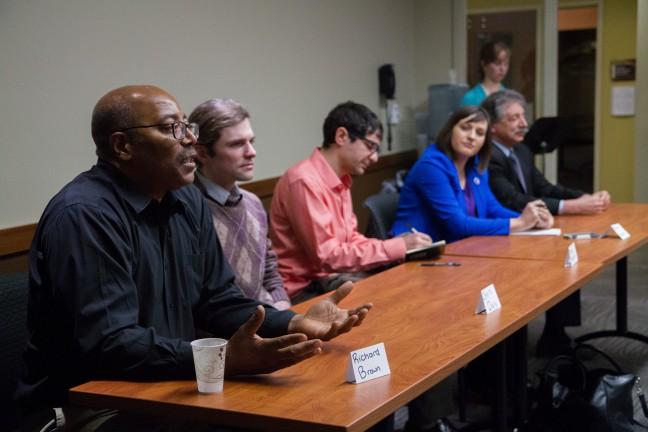The University of Wisconsin College Democrats endorsed Ald. Scott Resnick, District 8, in his race to unseat Madison’s mayor Tuesday following a forum with each of the candidates.
Eyeing the College Democrats’ endorsement for the Feb. 17 primary elections, the five candidates for Madison mayor debated student-centered issues at Union South Tuesday evening.
Resnick, who represents a student-dominated district in the City Council, is running against Mayor Paul Soglin. Also in the primary race are former Ald. Bridget Maniaci, who represented parts of downtown and the Langdon Street area; former Dane County Supervisor Richard Brown Sr.; and 25-year-old activist Christopher Daly, who, like the rest of his opponents, is a UW graduate.
The candidates answered five predetermined questions from the organization’s executive board, with Resnick eventually winning the endorsement.
Among the issues the candidates discussed were campus safety, the city’s job market for graduates, housing prices, racial disparities and student involvement in city government.
Sexual assault received heavy focus at the debate. Resnick, for example, referenced his actions as alder to increase lighting on campus area streets, a downtown safety initiative and his positive relationship with the police.
For Soglin, alcohol remained the largest factor in association with violence on campus.
“One of the problems with sexual assault is where we get a situation with high numbers of people drinking, and we don’t have witnesses that are effective,” Soglin said.
The candidates offered mixed responses on how they would address job opportunities in Madison for UW graduates. Daly recognized that outside of the government and technology industry, opportunities for grads with other skill sets was lacking.
“I believe that our current [city] economy is hyper-focused on a limited set of employment opportunities,” he said.
Resnick noted his expertise in the technology sector and said he wants to partner with groups in Dane County so they are aware of the talent in the student body, while Maniaci argued for a more comprehensive job board for students.
Brown touted the power of internships for giving students connections for future employment.
“We’ve got the state, city and county, and that’s going to get you in the door,” Brown said. “We can work with the private industry. You can do this. You can get these jobs.”
All candidates expressed the need for city involvement in balancing new luxury developments with affordable housing in an increasingly expensive rental market.
Resnick supported the implementation of a long term strategy for campus area housing.
“We need to make sure that affordable housing on campus is protected,” he said. “We need to come up with a fully united plan to make sure that students can afford to be on this campus.”
Soglin said the university must remain committed to building dorms, with the city creating a greater supply of housing to stabilize rents. Daly supported the use of tax incremental finance districts to fund housing projects.
Candidates also tackled racial disparities in the city, with Maniaci noting how the city must partner with market developers to focus on housing.
“One of the things I find really striking is how the city has been built and how development postwar has segregated neighborhoods by price, and as a secondary element race has been a major component as well,” she said. “Moving forward, we need to do everything we can to open up our neighborhoods.”
Soglin argued the political voice of people of color is not represented in the proportion it should be, and in response, Brown highlighted the worsening of racial disparities that may lead to more crime.
Daly focused on community policing, which he thought should have a different model. Resnick said only a bottom-up approach would help with disparities focusing on public transportation, early childcare and employment opportunities.
The top two candidates in February’s primary election will move on to the general election on April 7.



















